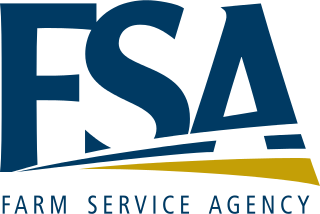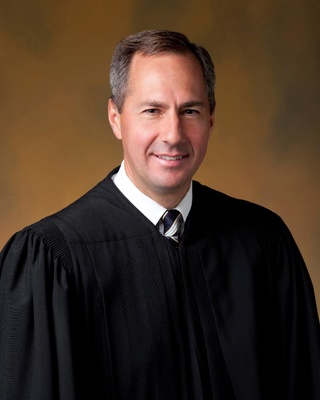
The United States Department of Agriculture (USDA) is the federal executive department responsible for developing and executing federal laws related to farming, forestry, rural economic development, and food. It aims to meet the needs of commercial farming and livestock food production, promotes agricultural trade and production, works to assure food safety, protects natural resources, fosters rural communities and works to end hunger in the United States and internationally. It is headed by the secretary of agriculture, who reports directly to the president of the United States and is a member of the president's Cabinet. The current secretary is Tom Vilsack, who has served since February 24, 2021.

Holmes County is a county in the U.S. state of Mississippi; its western border is formed by the Yazoo River and the eastern border by the Big Black River. The western part of the county is within the Yazoo-Mississippi Delta. As of the 2020 census, the population was 17,000. Its county seat is Lexington. The county is named in honor of David Holmes, territorial governor and the first governor of the state of Mississippi and later United States Senator for Mississippi. Holmes County native, Edmond Favor Noel, was an attorney and state politician, elected as governor of Mississippi, serving from 1908 to 1912.

Thomas James Vilsack is an American politician serving as the 32nd United States secretary of agriculture in the Biden administration. He previously served in the role from 2009 to 2017 during the Obama administration. A member of the Democratic Party, he served as the 40th governor of Iowa from 1999 to 2007.

The Farm Service Agency (FSA) is the United States Department of Agriculture agency that was formed by merging the farm loan portfolio and staff of the Farmers Home Administration (FmHA) and the Agricultural Stabilization and Conservation Service (ASCS). The Farm Service Agency implements agricultural policy, administers credit and loan programs, and manages conservation, commodity, disaster, and farm marketing programs through a national network of offices. The Administrator of FSA reports to the Under Secretary of Agriculture for Farm Production and Conservation. The current administrator is Zach Ducheneaux. The FSA of each state is led by a politically appointed State Executive Director (SED).
Robert S. BennettIII is an American attorney and senior counsel to Bennett LoCicero & Liu LLP. He is best known for representing President Bill Clinton during the Clinton–Lewinsky scandal.
Robert D. "Bob" Coble is a former mayor of Columbia, South Carolina. Coble has been a resident of Columbia for most of his life having graduated from Dreher High School in 1971 where he was student body president. Coble and Frannie Heizer won the 1971 South Carolina State High School Debate Championship. Coble graduated from the University of South Carolina in 1975 cum laude and the University of South Carolina School of Law in 1978 cum laude. Coble was elected to the Richland County Council in 1985 and served until 1988. Coble was elected Mayor of Columbia South Carolina in 1990 and served until 2010. Mayor Coble was elected Mayor five times and in his last re-election in 2006 received 64% of the citywide vote. He was succeeded as mayor by Steve Benjamin. Coble is married to Beth Coble, the daughter of former South Carolina Attorney General Daniel McLeod in 1978. They are the parents of six children and eleven grandchildren.

Thomas Michael Hardiman is a United States circuit judge of the United States Court of Appeals for the Third Circuit. Nominated by US President George W. Bush, he began active service on April 2, 2007. He maintains chambers in Pittsburgh, Pennsylvania and was previously a United States district judge.

Joseph Grundfest is an American academic. He is the William A. Franke Professor of Law and Business at Stanford Law School and co-director of the Rock Center on Corporate Governance at Stanford University. He joined Stanford's faculty in 1990 after having served for more than four years as a Commissioner of the United States Securities and Exchange Commission, a position to which he was appointed by President Ronald Reagan.

Sarah Vogel is a North Dakota farm advocate, author, former politician, and lawyer who served as the North Dakota Commissioner of Agriculture from 1989 to 1997. As a lawyer, she specialized in agricultural law.
The National Black Farmers Association (NBFA) is a non-profit organization representing African American farmers and their families in the United States. As an association, it serves tens of thousands of members nationwide. NBFA's education and advocacy efforts have been focused on civil rights, land retention, access to public and private loans, education and agricultural training, and rural economic development for black and other small farmers.
Pigford v. Glickman (1999) was a class action lawsuit against the United States Department of Agriculture (USDA), alleging that it had racially discriminated against African-American farmers in its allocation of farm loans and assistance from 1981 to 1996. The lawsuit was settled on April 14, 1999, by Judge Paul L. Friedman of the U.S. District Court for the District of Columbia. To date, almost $1 billion US dollars have been paid or credited to fewer than 20,000 farmers under the settlement's consent decree, under what is reportedly the largest civil rights settlement until that point. Due to delaying tactics by U.S. government officials, more than 70,000 farmers were treated as filing late and thus did not have their claims heard. The 2008 Farm Bill provided for additional claims to be heard. In December 2010, Congress appropriated $1.2 billion for what is called "Pigford II," settlement for the second part of the case.

Jonathan William Coppess was the administrator of the Farm Service Agency (FSA) of the Department of Agriculture, and was appointed on July 9, 2009 by Agriculture Secretary Tom Vilsack.

Shirley Sherrod is a former Georgia State Director of Rural Development for the United States Department of Agriculture. On July 19, 2010, she became a subject of controversy when parts of a speech she gave were publicized by Breitbart News, and she was forced to resign. However, upon review of the complete unedited video in context, the NAACP, White House officials, and Tom Vilsack, the United States secretary of agriculture, apologized for the firing and Sherrod was offered a new position.

The Claims Resolution Act of 2010 is a federal law enacted by the 111th Congress and signed into law by President Barack Obama on December 8, 2010. The act is a response to the Pigford v. Glickman case, where black farmers were found to have been discriminated against from 1983 to 1997 by the United States Department of Agriculture when applying for loans and assistance to start and to maintain farms. The case required a $50,000 dollar settlement to every discriminated farmer. However, many potential victims missed the application deadline for a settlement. The bill sets aside $1.5 billion for the estimated 75,000 farmers who are eligible for a settlement.
Donald F. Parsons, Jr. is an American former judge who served from October 22, 2003 until October 2015 on the Delaware Court of Chancery with the title of Vice Chancellor.

The role of African Americans in the agricultural history of the United States includes roles as the main work force when they were enslaved on cotton and tobacco plantations in the Antebellum South. After the Emancipation Proclamation in 1863-1865 most stayed in farming as very poor sharecroppers, who rarely owned land. They began the Great Migration to cities in the mid-20th century. About 40,000 are farmers today.
The USDA Coalition of Minority Employees is a civil rights organization formed by employees of the United States Department of Agriculture (USDA) in 1994 specifically focused on ending discrimination within the Department and more generally on eradicating racism in agriculture in the United States.

Janie Simms Hipp is the founder of the Indigenous Food and Agriculture Initiative at the University of Arkansas, founder of the U.S. Department of Agriculture's (USDA) Office of Tribal Relations in the Office of the Secretary, founding Executive Director of the Native American Agriculture Fund, agriculture and food lawyer, and policy expert. Hipp's work focuses on the intersection of Indian law and agriculture and food law. On June 10, 2021, she was confirmed as USDA General Counsel, the first Native American to serve in that role.
Love v. Vilsack refers to the 2001 lawsuit filed by a group of women farmers against the USDA. The lawsuit alleged that the USDA discriminated against female farmers through the agricultural loan process, and specifically named the Farm Service Agency (FSA). This lawsuit is often discussed in conjunction with Garcia v. Vilsack because of its similar timeline and like the Garcia v. Vilsack, the claims process for female farmers was voluntary, which meant that female farmers had to file claims individually.
Garcia v. Vilsack refers to a 2000 lawsuit brought by a hundred Hispanic farmers against the USDA, with the farmers claiming the organization had discriminated against Latino/Hispanic farmers. This lawsuit was filed at the US District Court for the District of Columbia.











